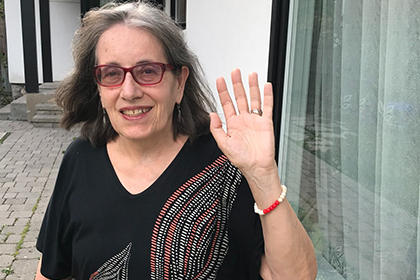Changing attitudes on menstrual health

When she started a career as a registered nurse 50 years ago and went looking for adventure, Peggy Thorpe found it among teams of missionaries working in rural Papua New Guinea.
She made trips of up to 8 hours by foot or on horseback to remote villages, where she monitored children’s growth, treated infections and delivered babies. At night her group shared a meal of roasted wild game that one of them had shot along the rugged trail earlier in the day.

Peggy Thorpe wearing the Menstruation Bracelet, a global symbol for menstruation.
It was a remarkable experience for the 21-year-old Thorpe, who had grown up in Sudbury, Ontario. One memory that especially stays with her is the sight of small huts dotted around the countryside, which were called “house sick moon” in the local Melanesian pidgin language. Simple and windowless, not much bigger than the size of a typical outhouse, these were places where women and girls were shut away for several days each month while they menstruated.
“They were cast aside, shunned and considered dirty,” recalls Thorpe. “Menstruation was felt to be sort of an illness, and the women in those cultures had to separate themselves from their families during the time they had their periods.”
It wasn’t something that Thorpe thought about much at the time. Indeed, menstrual health and hygiene had never been part of her medical training, and the topic was largely taboo back in Canada in the early 1970s. “Even today our language is replete with negative stereotypes for anything having to do with menstruation,” she says.
It’s something that Thorpe, now 71, has worked hard to change as a senior health adviser at Global Affairs Canada (GAC) working in the area of sexual and reproductive health and rights.
After she returned home in 1976, she furthered her education and went on to work in global health programs, joining GAC in 1990. She’s been posted to Indonesia, Bangladesh, Tanzania and Mozambique in positions dealing with maternal and child health, strengthening health systems and responding to the challenges of diseases like malaria, HIV and tuberculosis, with a special focus on water, sanitation and hygiene.
In the last few years, she joined a team working on sexual and reproductive health and rights and came to realize its close link with menstrual hygiene.
“You’re looking at comprehensive sexuality, education in school and out of school, and that includes the reproductive cycle, fertility awareness and gender, plus a host of issues that have never been addressed properly before,” Thorpe explains.
With the world very much focused on responding to the COVID-19 crisis, she argues that hygiene “has to be given much more attention at all levels” to deal with the pandemic and prevent future ones. “I think everybody, every family, every person in Canada recognizes the importance of water and sanitation, especially now.”
For instance, 818 million children worldwide lack basic sanitation services in their schools, and 40% of schools have no water. Even those with toilets often don’t have separate facilities for boys and girls, which is a problem when it comes to menstrual health and hygiene.
“How are girls expected to manage their periods when they have no water or no sex-segregated toilets?” she says. Without such facilities, many adolescent girls miss out on school for the several days each month they menstruate, so they fall behind and drop out. Menstruation is also a signal for some cultures that adolescent girls are fertile, which leads them to be forced into marriage.
Thorpe would “like to see more done in this space;” in fact, she’s remained working at GAC beyond the point when she planned to retire so she can keep raising awareness of the issue. She plans to leave the department in July and will continue to volunteer in the global movement for menstrual health and hygiene.
“It’s been a privilege that Global Affairs Canada has given me space to work in this area,” says Thorpe, who feels she’s had success in “bringing the evidence to the table” on menstrual health. “I believe with all my heart that it’s central to gender issues and many other aspects of addressing women’s development and basic needs, particularly in the least-developed countries.”
Even in Canada “we’re not there yet,” Thorpe points out. A 2019 survey by Plan International found that Canadian girls and women face shaming and teasing when buying menstrual hygiene products and lack information and support around their menstrual health.
Thorpe finds it “pretty exciting” to see increasing awareness of the issue of menstrual rights in Canada. Growing numbers of men and women are lobbying for women and girls to be able to manage their menstruation with dignity, she says. For example, there have been public campaigns to make free sanitary products available to women in prisons and girls in schools.
She finds policymakers at home and abroad more willing to speak about the issue but acknowledges that the solutions are not easy.
“I think progress has been made. You can talk more openly about it,” she says. “But changing minds and attitudes takes time. And that’s what we aim to do.”
- Date modified: